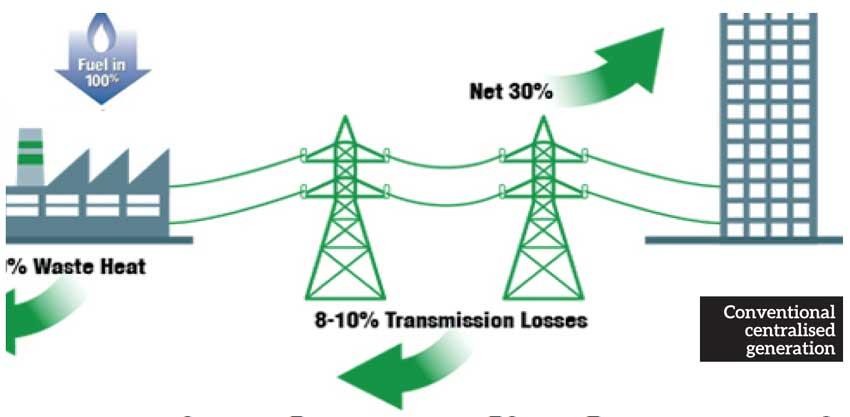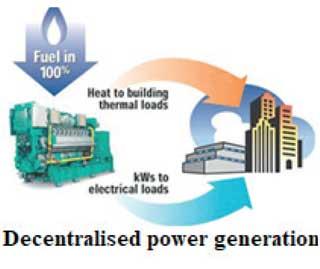Reply To:
Name - Reply Comment

 It appears that Sri Lanka is planning to introduce Liquefied Natural Gas (LNG) to the power-generation sector for the first time. LNG is a clean and relatively environmental-friendly energy source. However, coal is certainly the most cost-effective energy source for centralised power-generation in Sri Lanka apart from the risk of environmental pollution. On the other hand, coal has the world’s largest known fossil fuel reserves of 900TWyr compared to LNG (215TWyr) and fuel oil (240TWyr). Therefore, with the escalating demand for LNG around the world, the price stability of LNG should also be carefully analysed with that of Coal.
It appears that Sri Lanka is planning to introduce Liquefied Natural Gas (LNG) to the power-generation sector for the first time. LNG is a clean and relatively environmental-friendly energy source. However, coal is certainly the most cost-effective energy source for centralised power-generation in Sri Lanka apart from the risk of environmental pollution. On the other hand, coal has the world’s largest known fossil fuel reserves of 900TWyr compared to LNG (215TWyr) and fuel oil (240TWyr). Therefore, with the escalating demand for LNG around the world, the price stability of LNG should also be carefully analysed with that of Coal.

The main combustible matters that liberate heat during the combustion of conventional heat sources (e.g. LNG, biomass, coal, fuel oil, etc.) are Carbon and Hydrogen. The Carbon to Hydrogen ratio in LNG (3 to 1) is relatively lower than that of fuel oil (7 to 4) and Coal (13 to 6). The gross calorific value of LNG (52,358 kJ/kg) is higher than that of fuel oil (43,942kJ/kg) and coal (26,365 kJ/kg). The combustion efficiency and heat transfer performance of LNG combustion technologies are relatively higher than those of systems burning the other two commodities.
Since these power plants operate far away from the end-user, the remaining 60% of heat is released into the environment as waste heat. Heat cannot be economically transferred for long distances
This is due to a higher flame temperature and proper mixing of LNG with combustion air, resulting in low excess air required for complete combustion. Therefore, LNG generates about 30% less carbon dioxide (CO2) than fuel oil and 45% less than coal. Water vapour (H2O) generated during fuel combustion is also a greenhouse gas, but there is no accumulation of water vapour in the atmosphere like CO2 as it is associated with a natural cycle through evaporation and precipitation. The combustion of natural gas does not emit soot, dust, or fumes and almost no environmentally damaging sulphur dioxide (SO2) emissions. With the unavailability of Nitrogen in LNG (fuel nitrogen) and adoptability of advanced combustion technologies like staged combustion, a twofold reduction in Nitrogen Oxides (NOx) emissions can be observed. Therefore the use of LNG has an inherent advantage over the other fossil fuels.
The heat from high-temperature energy sources (e.g. LNG / fuel oil) can be converted to electricity more efficiently than other heat sources that have relatively low combustion temperatures
The main economic advantage of LNG is the use as a fuel in decentralised power generation systems. The process of electricity production using coal or heavy fuel oil (furnace oil) from remote locations is inefficient as it involves the production of heat energy first, which can only be converted into Electricity with an efficiency of about 40% (typically 35 - 40%, but modern hybrid cycles or commercially available combined cycle can go up to about 50% in tropical climates). Since these power plants operate far away from the end-user, the remaining 60% of heat is released into the environment as waste heat. Heat cannot be economically transferred for long distances.
Therefore, conventional centralised power generation systems already available in Sri Lanka are less productive in terms of fuel usage. Since LNG is a clean and economically transportable fuel, the decentralised power generation using co-generation and tri-generation systems operating at the proximity of the bulk energy consumers who consume electricity and heat in large quantities enhances the productivity of fuel usage.
Export processing zones, hospitals, and hotels are considered as bulk energy consumers with the need to use electricity, heating, and cooling simultaneously
Export processing zones, hospitals, and hotels are considered as bulk energy consumers with the need to use electricity, heating, and cooling simultaneously. Mostly, electricity is the prime source of energy for air conditioning while fuel oil is used for heating. The main concept of tri-generation systems, that produce electricity, heating, and cooling simultaneously, is based on using this waste heat for air conditioning or any other cooling or heating purpose. The minimisation of carbon dioxide emission (Carbon footprint) is an essential part of the tri-generation systems which is a distributed method of efficient energy production adapted by major cities in the US, UK, Canada, Europe, and Australia. This provides business value for the heat generated in the process of electricity generation. Since the electricity and heat needed are produced on-site, low energy distribution/transmission losses are also achieved.
LNG is a clean and relatively environmental-friendly energy source. However, coal is certainly the most cost-effective energy source for centralised power-generation in Sri Lanka apart from the risk of environmental pollution
The heat from high-temperature energy sources (e.g. LNG / fuel oil) can be converted to electricity more efficiently than other heat sources that have relatively low combustion temperatures. Therefore, in this way we can utilise fossil fuels more productively rather than just for heating application.
Tri or cogeneration systems typically show higher combined efficiencies (combined generation of electricity and useful heat) of about 85% whereas the modern combined cycle power plants operating in remote tropical climates have shown only about 50%.